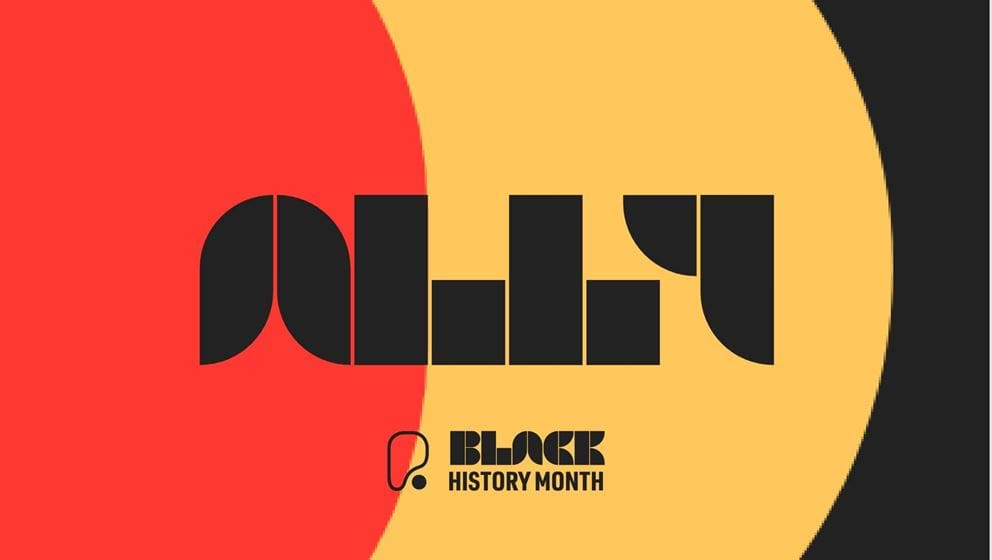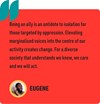How to be an ally

October marks Black History Month in the UK, a key time to acknowledge achievements and provide an opportunity to discuss wider issues affecting the Black community in the UK and around the world.
It’s also a reminder we still need continued action to tackle racism and ensure Black history is represented and celebrated all year round.
This year’s theme is Time for Change: Action not Words.
We can all come together to make a change for the better, with our actions we can become strong allies for the Black community. In the workplace this means having policies in place that achieve real outcomes. As an individual, it means practising what you preach.
What is an ally?
Being an ally means being willing to act with and for others in pursuit of ending oppression and creating equality. Being an ally is more than being sympathetic to those that experience discrimination. An ally is someone who has a commitment to fighting oppression and prejudice through the willingness to educate themselves and challenge their own opinions and beliefs.
It is up to people who hold a position of privilege over underrepresented groups of people to act as allies in order to help make active changes and help others’ voices to be heard.
HOW TO BE AN ALLY DURING BLACK HISTORY MONTH AND BEYOND
1. Be open minded and listen: The best way for us all to learn is to listen to others’ experiences and views. It is important to be open-minded and be willing to learn in these situations.

2. Widen your social circle: Widening our social circle can allow us to educate ourselves further by being around people from different backgrounds, cultures & experiences.
This can broaden our knowledge and allow us to rid ourselves of any unconscious bias we may have about certain groups.
3. Take Action: See being an ally as being an action rather than a label. If you are visibly showing your support and having conversations about race & asking questions can create an environment where more people feel safe and comfortable to be themselves and out at work.

4. Avoid assumptions: Avoid using stereotypical language or categorising people based on learned bias, do not assume that just because someone is a different ethnicity/race that they are not the same nationality as you.
5. Continue to educate yourself: It is important that we don’t simply rely on others to tell us how we can be an ally. We should ensure we do our own research - there are plenty of resources available for us to use.
6. Language Matters: If you are unsure how to address someone whether i.e., name pronunciations or spelling it’s always best to ask. Make sure to avoid microaggressions, remember if you get it wrong you should apologise.

7. Speak out: If you hear people make racist or offensive comments and jokes, call them out and educate them why what they have said is offensive. It might be too embarrassing or intimidating for those who are targeted to do it themselves.
APOLOGISING
It is ok to still be learning and to make mistakes, being an ally means that you realise you have said the wrong thing but are willing to do better. Apologies hold you accountable. They tell others that you are taking responsibility, are open to the consequences of your actions, and plan to do better in the future.
Good apologies are heartfelt acts that let go of pride and ego. They centre the pain of the impacted, regardless of the apologiser's intent. Apologies aren't a magic fix and won't solve mistakes of the past, but there are a few attributes that make for a good apology.
MAKING AN APOLOGY
Timeliness: Ensure the apology is delivered at the right moment in the right place and time. Consider the context in which you want to apologise and how that might affect not only you but also the person receiving your apology.
Boundaries: Your desire to give an apology right now doesn't mean that the receiver is ready for it. Some people need space to process, and you should respect that. When they’re willing to reconnect, if at all, they may let you know (or they may not).
Self-awareness: Know that the act of apology may not lead to the closure you expect. The apology receiver may choose to never interact with you again. Either after you give an apology or before you give it. You must find a way to make peace with that. Do not pressure or shame someone into accepting your apology.
Reflection: Signals that the apologiser is taking responsibility for their actions. Apologising means letting go of your ego to show that you care about someone and want to make things right. Good apologies centre the person being apologised to. They also take direct ownership of actions that caused pain by naming them clearly.
It’s important to be an ally all year round, not just for Black History Month. This campaign forms part of our work with our Employee Network Groups, bringing together employees and allies from across the business that allows us to hear from different voices and help them share their unique experiences, perspectives, and ideas.




